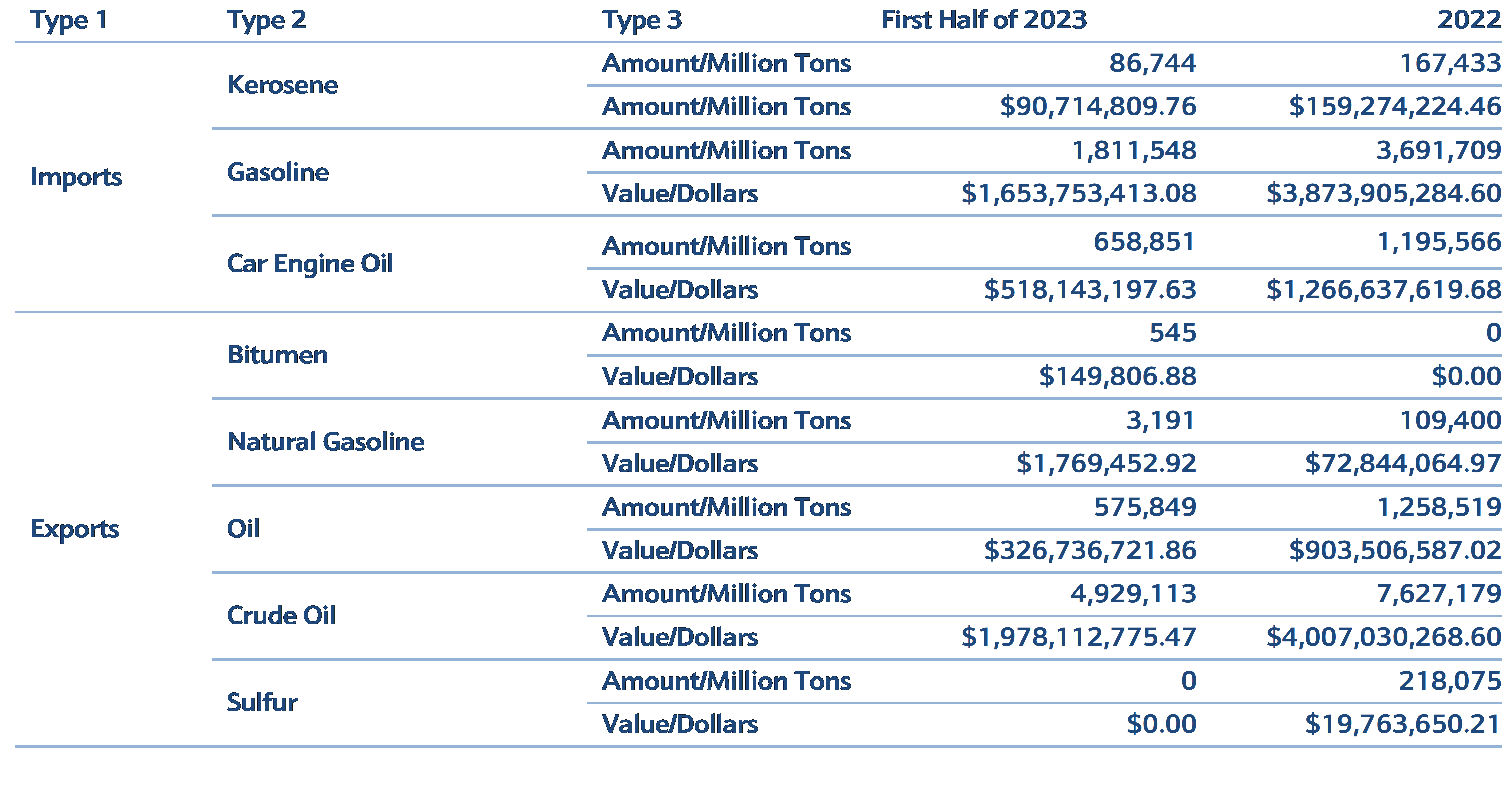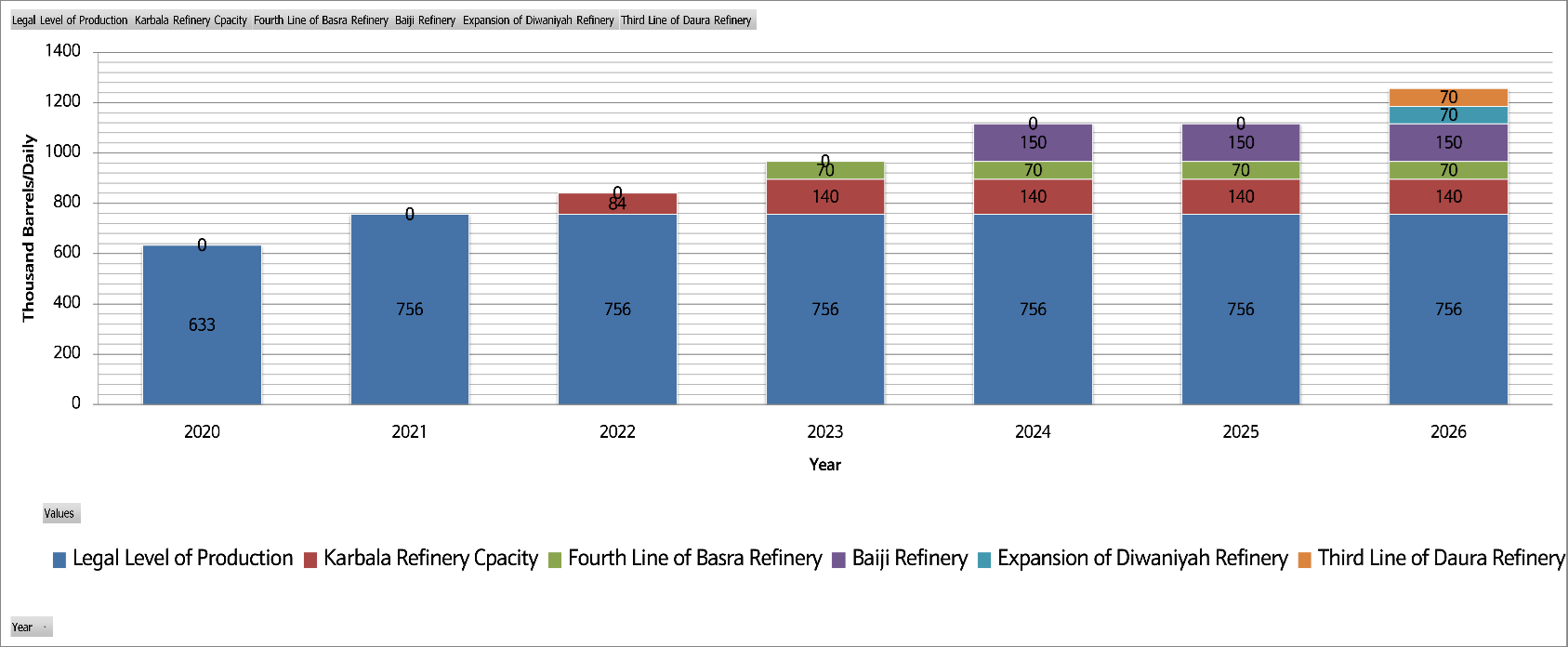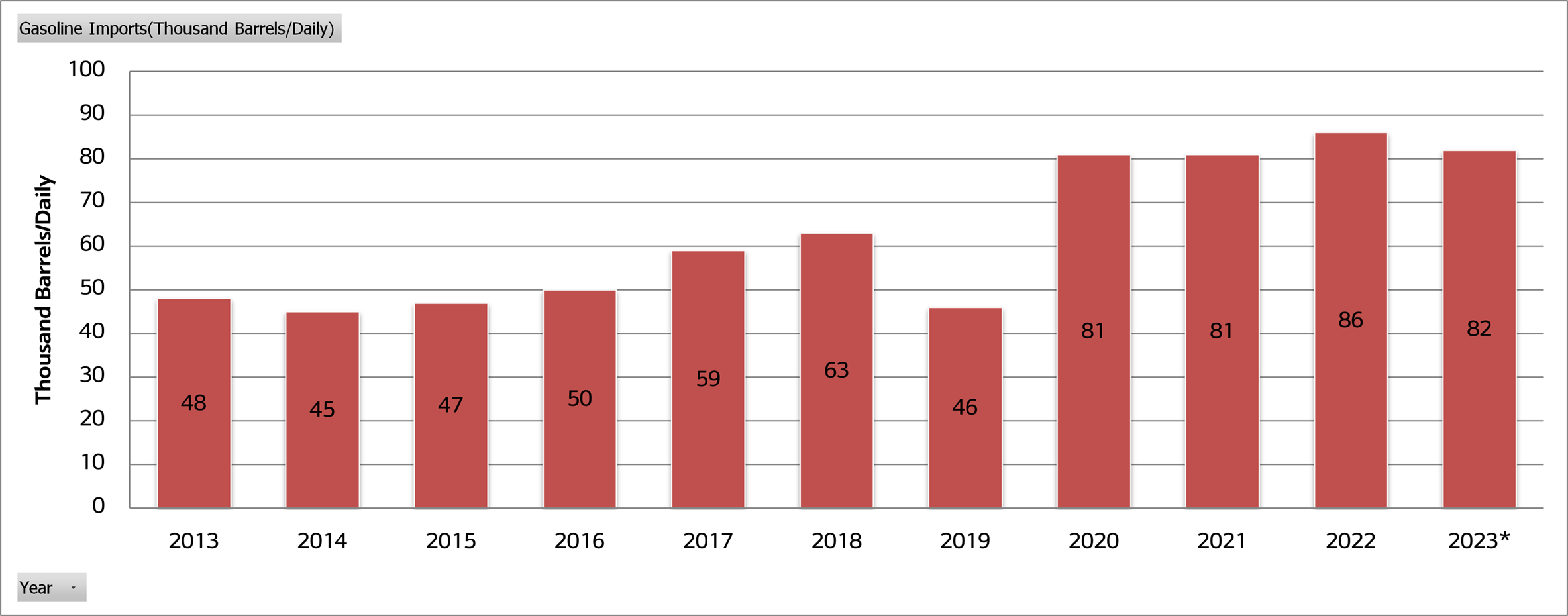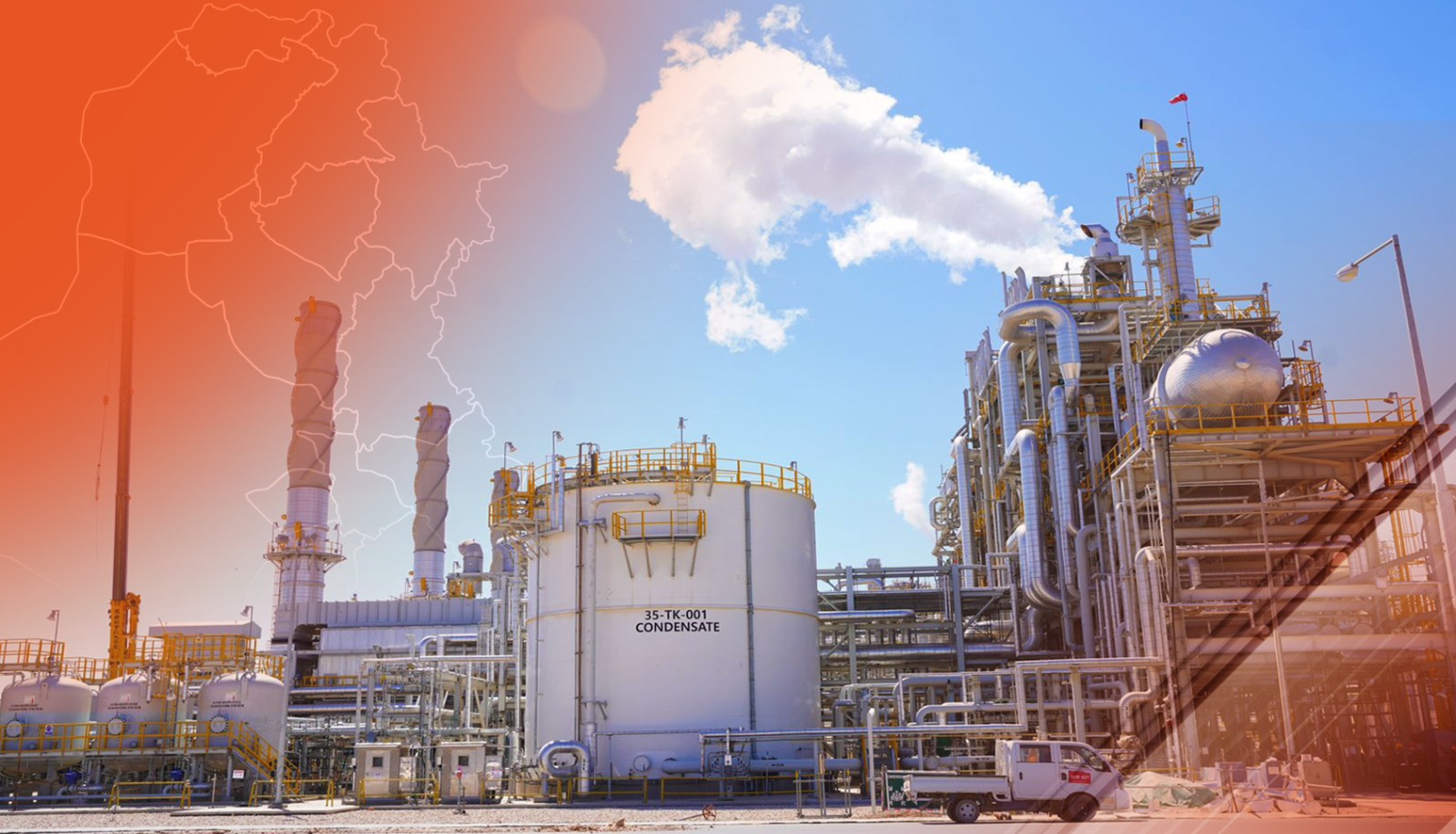Expansion of Official and Unofficial Crude Oil Refineries in Iraq and the Kurdistan Region
25-12-2023
Iraq plans to increase its refinery capacity to 1.25 million barrels of crude oil in the coming years. Apart from its five official refineries, the Kurdistan Region owns dozens of small and medium-sized unofficial refineries in Erbil, Sulaimani, and Duhok provinces. Collectively, these facilities currently refine over 286,000 barrels of crude oil daily, exporting their products to domestic markets.
Iraq aims to reduce the import of oil products, particularly gasoline, to the lowest possible level ideally reaching zero by 2026. This ambition relies on the fulfillment of promises from Sudani and Iraqi Oil Ministry to commission the Baiji refinery and open the fourth line of the Basra, Diwaniyah, and Daura refineries. This stands in contrast to the Karbala refinery project, which faced the need for repairs at the time of its opening.
In the past 18 months, Iraq has imported three oil products valued at over $7.4 billion, with $5.5 billion allocated to gasoline alone. These products are being sold at subsidized prices in the market, resulting in an annual cost to the country exceeding $14 billion.
Despite Iraq's efforts to balance the financial aspects of oil product imports and exports, the nation faces challenges in meeting its domestic needs. Despite the sector's growth, Iraq exports a specific type of crude oil daily in one tanker while importing other essential types, like automotive engine oil, in a separate tanker.
Following the suspension of oil exports to the world market, some companies now all have shifted to producing oil for the domestic market, intensifying the operations of small and medium unofficial refineries. This has led to a daily increase in the combustion of crude oil towers, gasoline, crude oil, and bitumen. While this provides a short-term financial gain and serves as a temporary solution for domestic oil production, its continuation could inflict significant economic damage on the Kurdistan Region and Iraq. Despite being sold at approximately $30-38 per barrel, there are concerns about long-term environmental damage.
Iraq's Oil Product Import and Export Dynamics
If we closely examine the imported and exported petroleum products, we can clearly observe some interesting points regarding the absence of an advanced refining industry. This deficiency is evident not only for gasoline but also for engine fuel oil. Last year, approximately $1.2 billion was spent on this type of product, depleting Iraq's resources. Another noteworthy aspect is the absence of advanced domestic crude oil refining industries. According to the data, Iraq's primary oil export is crude oil, a trend that holds true for the Kurdistan Region as well.
In the first half of 2023, Iraq imported three types of oil products valued at $2.26 billion, comprising kerosene worth $90.7 million, automotive oil valued at $518 million, and gasoline amounting to $1.65 billion, as per data released by SOMO. Concurrently, oil products worth $2.3 billion were exported during the same period.
Last year, Iraq imported oil products worth $5.29 billion, with $3.8 billion allocated to gasoline. Simultaneously, the country exported oil products totaling $5 billion, including over $4 billion in crude oil.
According to the International Energy Agency, in 2022 alone, Iraq provided $22 billion in subsidized energy expenditures, constituting approximately 8 percent of the country's total GDP growth. More than $14 billion of this sum is allocated for oil alone.
Table 1: Quantity and value of oil products exported and imported in Iraq during the past 18 months

Source: Iraqi Oil Ministry, SOMO Company 3-12-2023
Refinery Capacity in Iraq and the Kurdistan Region and the Potential for Domestic Gasoline Supply
The Iraqi prime minister inaugurated the Karbala refinery this spring, despite previous setbacks. According to official statements, it refines 140,000 barrels of crude oil per day. During a visit to the Baiji refinery this year, he emphasized meeting domestic needs through domestic oil product production.
The Iraqi Oil Ministry has tasked the Northern Oil Company with operating and repairing the Baiji refinery, boasting a capacity of 150,000 barrels per day. As the largest refinery in Iraq, constructed in 1978, it has the potential to increase daily production to 293,000 barrels if operating at full capacity.
If the decisions are finalized, the capacity of Iraqi refineries will rise from 896,000 barrels per day to 1.256 million barrels per day within the next two years. Half of this increase is attributed to the Baiji refinery, expected to contribute to domestic production early next year.
Graph 1: Refining capacity of Iraqi refineries between 2020 and 2026

Source: Iraqi Oil Ministry, 3-12-2023, OPEC and MEES 2-12-2023
While there is no official data on crude oil refining in the Kurdistan Region, there are five large official refineries in the provinces with a combined daily refining capacity of 333,000 barrels of crude oil. Presently, based on collected data, Kar and Lanaz refineries in Erbil province produce approximately 170,000 barrels of crude oil per day. In Sulaimani province, Bazian and Dukan refineries contribute 51,000 barrels per day, and DNO refineries in Duhok province produce 6,000 barrels of crude oil per day.
Presently, due to the absence of oil exports to the port of Ceyhan and foreign markets, the produced oil is sold domestically. According to the latest reports, the total oil production in Kurdistan has surpassed 286,000 barrels per day. This increase is attributed to DNO's elevated production in the Tawke and Fishkhabur oil fields to 90,000 barrels per day and the resumed production in the Atrush field, initially at 15,000-25,000 barrels per day and now at 10,000 barrels per day for the domestic market.
The surge in crude oil production has prompted the reopening of small and medium-sized unofficial refineries, previously closed. These refineries are now operational, refining crude oil for the Kurdistan Regional Government markets. Their daily refining capacity ranges from 500 barrels of crude oil to thousands barrels per day across all three provinces of the Kurdistan Region.
The increase in domestic production has resulted in fewer gasoline imports than at the beginning of this year to meet domestic needs. According to the Ministry of Natural Resources, the Kurdistan Region requires 4 to 5 million liters of gasoline daily.
An interesting aspect of oil refineries in Iraq is their capacity to refine crude oil. Gasoline, kerosene, and car engine oil are the three essential needs of Iraqis today. However, these products are not directly produced in refineries. Instead, after refining gasoline, a significant amount of crude oil, bitumen, and other products are obtained. Last year, Iraq's daily demand for gasoline reached 165,000 barrels, with approximately half of it imported from abroad—amounting to 86,000 barrels of gasoline.
According to data from MEES and the JODI data initiative, gasoline imports have nearly doubled over the past decade. Specifically, imports rose from 48,000 barrels per day in 2013 to 86,000 barrels per day in 2022, and they reached 82,000 barrels per day in the first eight months of this year.
A significant factor contributing to this increase is the rising number of private cars in Iraq. Earlier this year, the Ministry of Planning stated that 7.46 million vehicles
registered in Iraq and the Kurdistan Region in 2022, reflecting a growth of 433,000 compared to last year. If we interpret this data on an individual basis, it suggests that approximately every five people in Iraq will have a private car. The scale of this industry is growing annually, particularly for large cars and vehicles with sizable engines. In 2021, Iraq imported cars valued at $2.22 billion, ranked third in terms of good imported by Iraq.
The surge in the number of private vehicles in Iraq alone from 2021 to 2022 has elevated the daily demand for gasoline by 25,000 barrels or 3.9 million liters. This surpasses environmental and climatic thresholds, contributing to the proliferation and rise in cancer cases.
Graph 2: Gasoline imports during 2013 to 2023

Source: JODI data, 3-11-2023 and MEES, Iraqi Ministry of Oil
Conclusion
The swift rise in the number of official refineries in Iraq, the functioning of these official refineries, and the reopening of numerous unofficial refineries in the Kurdistan Region this year, coupled with the intentions of both to boost the daily refining capacity of their official refineries for crude oil, bring three significant points to our attention:
Firstly, as specific data on Iraq indicate, this has not only diminished the current needs of Iraqis for crude oil products, such as gasoline and engine oil, but has also led to increased imports due to the growing domestic demand for these products.
Secondly, this expansion to meet domestic demand for oil products in Iraq and the Kurdistan Region contrasts with recent developments at COP28, where 118 countries pledged to triple production, boost renewable energy, and allocated tens of billions of dollars to combat climate change. These changes are palpable in the Kurdistan Region and Iraq. In essence, where is the world headed, and where is Iraq heading?
Thirdly, the expansion of domestic refineries to fulfill local needs, while economically beneficial in terms of returning money to public revenue and contributing to GDP growth, poses significant environmental and health risks in the future. This is in contrast to the global trend shifting away from conventional energies and promoting investment and utilization of renewable energies.






